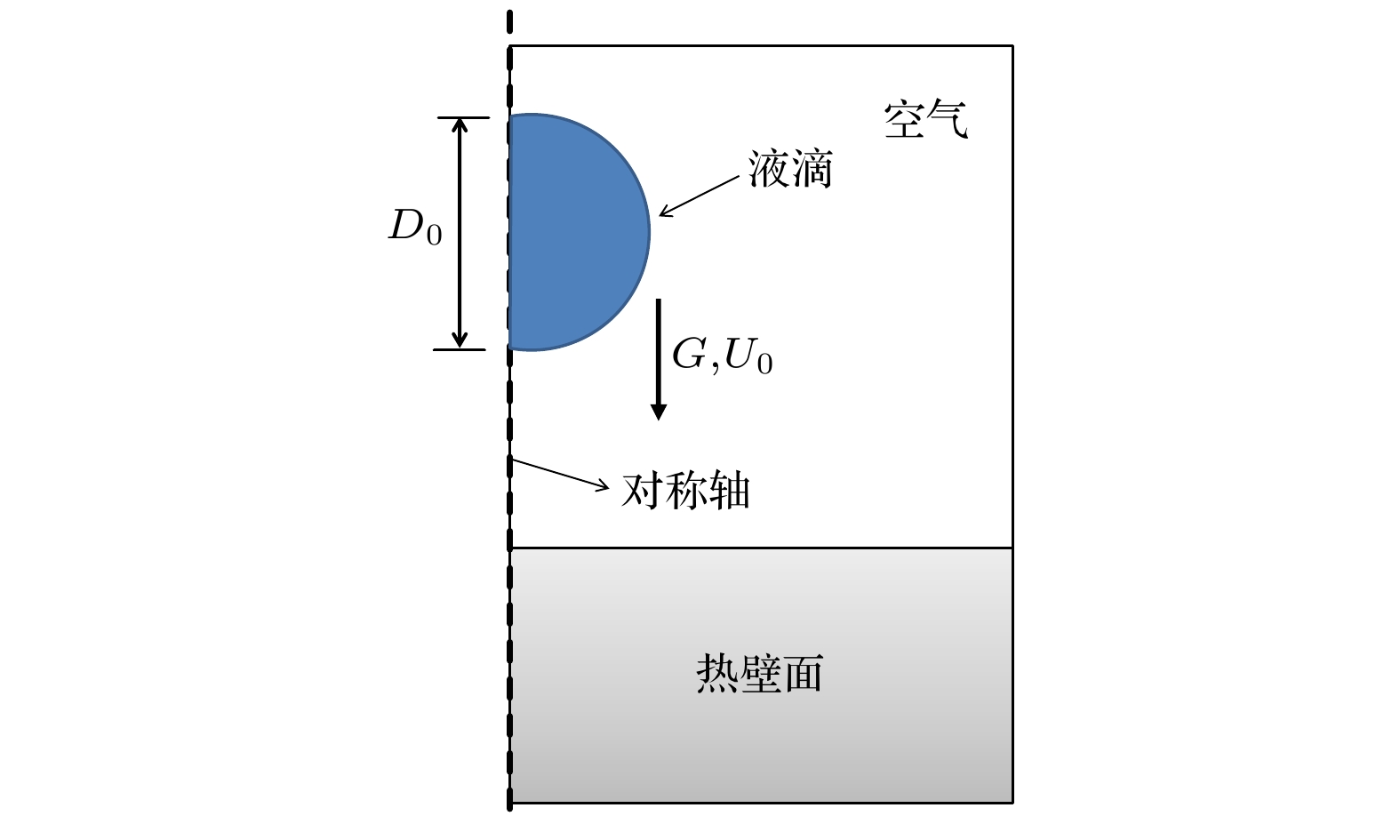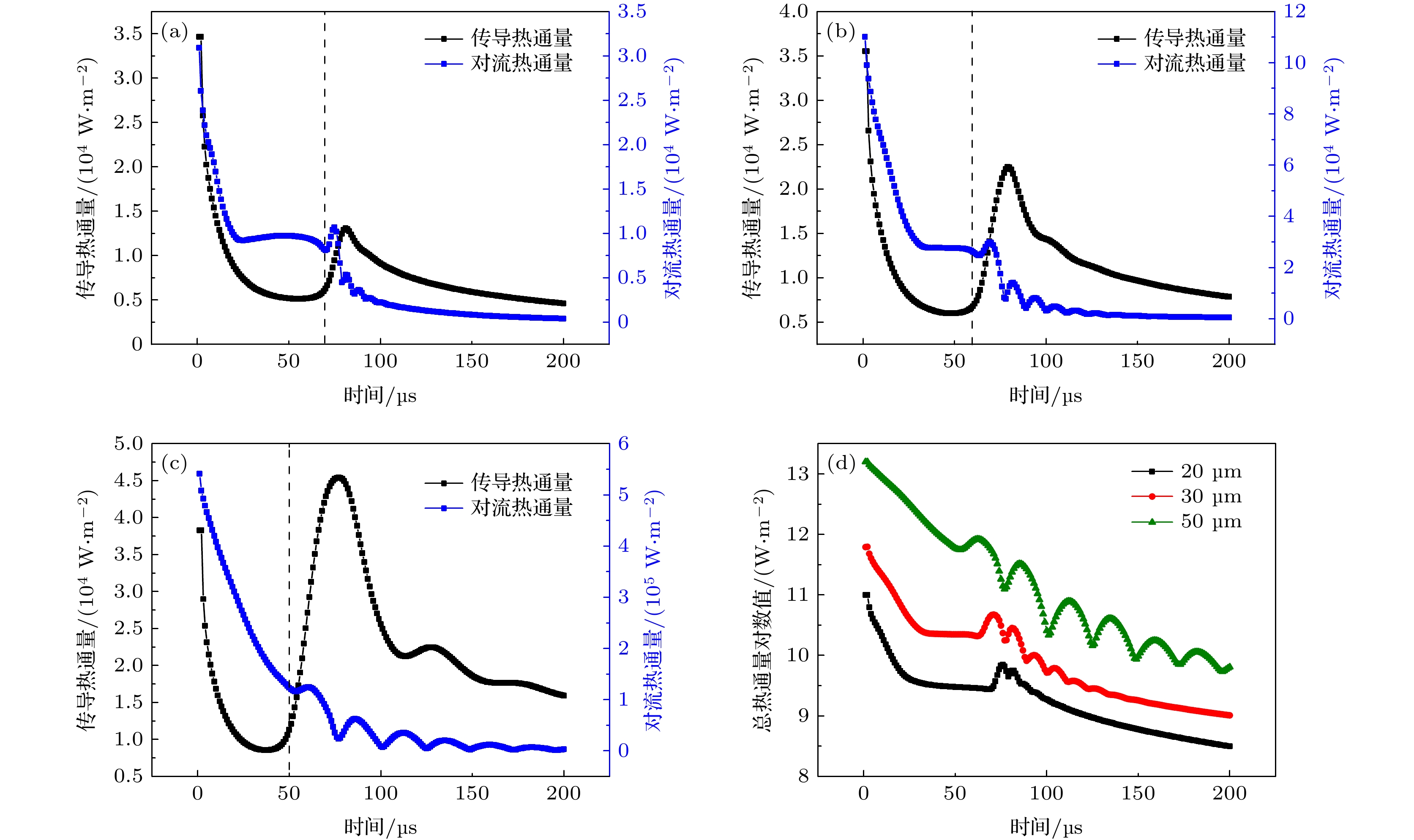-
The phenomenon of small droplets impacting on the wall is widely used in fields such as spray cooling. In recent years, the research on the behavior of droplets impacting on a wall has been extensively concerned by scholars. However, current research mainly focuses on the flow and heat transfer characteristics of large droplets (millimeters) impacting on a hot wall. Since the dynamic and thermodynamic characteristics of small droplets (micrometers) impacting on the hot wall are significantly different from those of large droplets, the research on the behavior of small droplets impacting on the hot wall will further facilitate the understanding of the heat transfer mechanism. In order to study the heat transfer process of small droplets impacting on the hot wall (non-boiling zone), a two-dimensional transient model of droplets impacting on the wall is established, and the phase field method is used to analyze the convective heat flux and heat conduction heat flux in the heat transfer process of small droplets. The effect of velocity, wettability and droplet size on the heat transfer characteristics of droplets impacting on the wall are explored. The simulation results show that the phase field method is feasible in studying the behavior of small droplets impacting on the wall. Furthermore, the research results show that the initial stage of droplet impacting on the wall is “cold spot”, which is conducive to the heat transfer between the small droplet and the wall. The peak heat flux during the small droplet impacting on the wall is near the three-phase contact point, and it is on the order of 105–106 W/m2. The influence of wall wettability and droplet size on the conductive heat flux during the small droplets impacting on the wall are more significant, while velocity and droplet size have a significant influence on convective heat flux. In most cases, the conduction heat flux of small droplets impacting on the wall is about 103–105 W/m2, and the convective heat flux is about 104–106 W/m2. The convective heat flux is larger than the conduction heat flux, and it plays a dominant role in the whole process of heat transfer. The above conclusions are helpful in enriching the heat transfer mechanism of small droplets impacting on the hot wall, and implementing the spray cooling and other technologies.
-
Keywords:
- small droplet /
- impact surface /
- heat transfer characteristics /
- phase field method
[1] Horacek B, Kiger K T, Kim J 2005 Int. J. Heat Mass Transfer 48 1425
 Google Scholar
Google Scholar
[2] Pais M R, Chow L C, Mahefkey E T 1992 Int. J. Heat Transfer 114 211
 Google Scholar
Google Scholar
[3] Opoku R, Kizito J P 2020 RINENG 6 100
 Google Scholar
Google Scholar
[4] Yang Y, Yang L, Du X, Yang Y 2019 Appl. Therm. Eng. 163 114401
 Google Scholar
Google Scholar
[5] Yang H, Rong L, Liu X, Liu L, Fan M, Pei N 2020 Energy Rep. 6 906
 Google Scholar
Google Scholar
[6] Hajidavalloo E, Eghtedari H 2010 Int. J. Refrig. 33 982
 Google Scholar
Google Scholar
[7] Zhang C, Liu H 2016 Phys. Fluids. 28 062107
 Google Scholar
Google Scholar
[8] Zhang Q, Zhu W B 2021 J. Propul. Technol 1 (accepted)
[9] Visser C W, Tagawa Y, Sun C, Lohse D 2012 Soft Matter 8 10732
 Google Scholar
Google Scholar
[10] Yarin A L, Weiss D A 1995 J. Fluid Mech. 283 141
 Google Scholar
Google Scholar
[11] Pasandideh-Fard M, Aziz S D, Chandra S, Mostaghimi J 2001 Int. J. Heat Fluid Fl. 22 201
 Google Scholar
Google Scholar
[12] Lee J, Kim J, Kiger K T 2001 Int. J. Heat Fluid Fl. 22 188
 Google Scholar
Google Scholar
[13] Hase M, Weigand B 2004 Int. J. Numer. Method. H. 14 85
 Google Scholar
Google Scholar
[14] Berberovic E, Roisman I V, Jakirlic S, Tropea C 2011 Int. J. Heat Fluid Fl. 32 785
 Google Scholar
Google Scholar
[15] 叶学民, 李永康, 李春曦 2016 23 234701
 Google Scholar
Google Scholar
Ye X M, Li Y K, Li C X 2016 Acta Phys. sin. 23 234701
 Google Scholar
Google Scholar
[16] Guggilla G, Narayanaswamy R, Pattamatta A 2019 Exp. Therm. Fluid Sci. 110 109916
 Google Scholar
Google Scholar
[17] Gelissen E J, Geld C W M, Baltussen M W, Kuerten J G M 2019 Int. J. Multiphase Flow 123 103173
 Google Scholar
Google Scholar
[18] 黄龙, 刘昭亮, 王玉洁 2020 制冷与空调 34 283
 Google Scholar
Google Scholar
Huang L, Liu Z L, Wang Y J 2020 Refrig. Air-Cond. 34 283
 Google Scholar
Google Scholar
[19] Cahn J W 1961 Acta Metall. Sin 9 795
 Google Scholar
Google Scholar
[20] Van D, Dirkjan B, Le C C 2004 Phys. Fluids 16 3403
 Google Scholar
Google Scholar
-
图 5 壁面不同位置热流密度分布, 与固液界面垂直距离分别为 (a) 0 μm, (b) 10 μm, (c) 20 μm, (d) 30 μm, (e) 40 μm, (f) 50 μm, (g)具体位置示意图
Figure 5. The heat flux distribution at different positions on the wall, the vertical distances from the solid-liquid interface are respectively (a) 0 μm, (b) 10 μm, (c) 20 μm, (d) 30 μm, (e) 40 μm, (f) 50 μm, (g) Specific location diagram
-
[1] Horacek B, Kiger K T, Kim J 2005 Int. J. Heat Mass Transfer 48 1425
 Google Scholar
Google Scholar
[2] Pais M R, Chow L C, Mahefkey E T 1992 Int. J. Heat Transfer 114 211
 Google Scholar
Google Scholar
[3] Opoku R, Kizito J P 2020 RINENG 6 100
 Google Scholar
Google Scholar
[4] Yang Y, Yang L, Du X, Yang Y 2019 Appl. Therm. Eng. 163 114401
 Google Scholar
Google Scholar
[5] Yang H, Rong L, Liu X, Liu L, Fan M, Pei N 2020 Energy Rep. 6 906
 Google Scholar
Google Scholar
[6] Hajidavalloo E, Eghtedari H 2010 Int. J. Refrig. 33 982
 Google Scholar
Google Scholar
[7] Zhang C, Liu H 2016 Phys. Fluids. 28 062107
 Google Scholar
Google Scholar
[8] Zhang Q, Zhu W B 2021 J. Propul. Technol 1 (accepted)
[9] Visser C W, Tagawa Y, Sun C, Lohse D 2012 Soft Matter 8 10732
 Google Scholar
Google Scholar
[10] Yarin A L, Weiss D A 1995 J. Fluid Mech. 283 141
 Google Scholar
Google Scholar
[11] Pasandideh-Fard M, Aziz S D, Chandra S, Mostaghimi J 2001 Int. J. Heat Fluid Fl. 22 201
 Google Scholar
Google Scholar
[12] Lee J, Kim J, Kiger K T 2001 Int. J. Heat Fluid Fl. 22 188
 Google Scholar
Google Scholar
[13] Hase M, Weigand B 2004 Int. J. Numer. Method. H. 14 85
 Google Scholar
Google Scholar
[14] Berberovic E, Roisman I V, Jakirlic S, Tropea C 2011 Int. J. Heat Fluid Fl. 32 785
 Google Scholar
Google Scholar
[15] 叶学民, 李永康, 李春曦 2016 23 234701
 Google Scholar
Google Scholar
Ye X M, Li Y K, Li C X 2016 Acta Phys. sin. 23 234701
 Google Scholar
Google Scholar
[16] Guggilla G, Narayanaswamy R, Pattamatta A 2019 Exp. Therm. Fluid Sci. 110 109916
 Google Scholar
Google Scholar
[17] Gelissen E J, Geld C W M, Baltussen M W, Kuerten J G M 2019 Int. J. Multiphase Flow 123 103173
 Google Scholar
Google Scholar
[18] 黄龙, 刘昭亮, 王玉洁 2020 制冷与空调 34 283
 Google Scholar
Google Scholar
Huang L, Liu Z L, Wang Y J 2020 Refrig. Air-Cond. 34 283
 Google Scholar
Google Scholar
[19] Cahn J W 1961 Acta Metall. Sin 9 795
 Google Scholar
Google Scholar
[20] Van D, Dirkjan B, Le C C 2004 Phys. Fluids 16 3403
 Google Scholar
Google Scholar
Catalog
Metrics
- Abstract views: 9589
- PDF Downloads: 182
- Cited By: 0















 DownLoad:
DownLoad:







